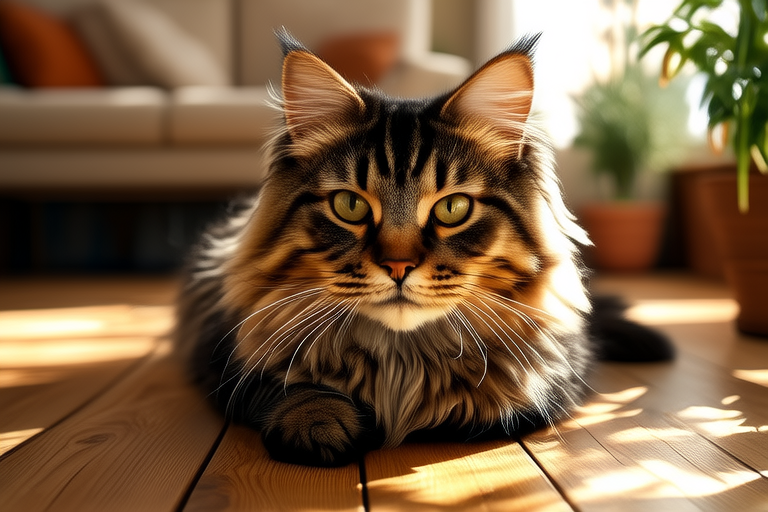The Ultimate Guide to Living with a Lovable Maine Coon
Welcome to the world of Maine Coons, one of the most beloved and fascinating cat breeds. Known for their friendly nature, striking appearance, and playful demeanor, Maine Coons are often referred to as “gentle giants.” This comprehensive guide will help you understand everything about these magnificent creatures, from their history to their care needs.
History of Maine Coons
Maine Coons have a rich history that dates back centuries. They originated in New England, where they were prized for their hunting skills and companionship. These cats were bred by farmers and sailors who needed robust, intelligent animals to catch rodents and protect their homes and ships. Their thick coats and large size made them well-suited for the harsh New England winters.
Characteristics of Maine Coons
Maine Coons are known for their distinctive features. They have long, shaggy coats, tufted ears, and bushy tails. Males can weigh up to 18 pounds, while females are slightly smaller. Their eyes are usually green, gold, or copper, adding to their majestic appearance. Maine Coons are also famous for their vocalizations, which range from chirps and trills to loud meows.
Care Needs
Maine Coons require regular care to maintain their health and happiness. Provide them with a comfortable, safe space to rest and play. Ensure that their litter box is clean and easily accessible. Offer plenty of toys to keep them entertained, and engage in interactive play sessions to stimulate their minds and bodies.
Dietary Requirements
A balanced diet is crucial for your Maine Coon’s well-being. Feed them high-quality cat food that meets their nutritional needs. Consult with your veterinarian to determine the appropriate amount and type of food for your cat. Fresh water should always be available. Avoid feeding them table scraps or human foods that may be harmful to cats.
Health Issues
Like all breeds, Maine Coons are prone to certain health issues. Common problems include hip dysplasia, heart disease, and hypertrophic cardiomyopathy. Regular veterinary check-ups can help detect and manage these conditions early. Early intervention can significantly improve your cat’s quality of life.
Grooming Tips
Grooming is essential for maintaining your Maine Coon’s coat and overall health. Brush their fur at least once a week to prevent matting and reduce shedding. Trim their nails every few weeks and clean their ears gently to avoid infections. Bathing is generally not necessary unless they get particularly dirty. Use pet-safe products and be gentle during grooming sessions.
Training Methods
Maine Coons are highly intelligent and trainable. Positive reinforcement techniques, such as clicker training and treats, work best. Teach them basic commands like “sit,” “stay,” and “come.” Encourage good behavior through praise and rewards. Be patient and consistent, and remember that each cat learns at its own pace.
Ensuring a Harmonious Living Environment
To create a harmonious living environment for your Maine Coon, consider the following:
- Provide vertical spaces: Cats love to climb and explore. Install cat trees, shelves, or window perches to give them ample opportunities to exercise and observe their surroundings.
- Minimize stress: Maine Coons thrive in calm, predictable environments. Introduce changes gradually and provide hiding spots for them to retreat when feeling overwhelmed.
- Interactive play: Engage your cat in daily play sessions using toys that stimulate their natural hunting instincts.
Social Behavior and Intelligence
Maine Coons are known for their social behavior and intelligence. They enjoy spending time with their human family and can form strong bonds with their owners. They are curious, playful, and often follow their humans around the house. Their intelligence makes them easy to train and responsive to positive reinforcement.
Personal Anecdote: My Maine Coon, Whiskers, has a unique habit of greeting me at the door every evening. She stands on her hind legs, paws me affectionately, and then leads me to her favorite spot on the couch. It’s a heartwarming ritual that reminds me how much she values our bond.
Compatibility with Families
Maine Coons are excellent companions for families. They are patient with children and can adapt to various household dynamics. However, it’s important to supervise interactions between children and pets to ensure everyone’s safety and comfort. Teach children how to handle cats gently and respect their boundaries.
Expert Advice
Consulting with experts can provide valuable insights into caring for your Maine Coon. Veterinarians, animal behaviorists, and breeders can offer personalized advice based on your cat’s specific needs. Join local cat clubs or online communities to connect with other Maine Coon owners and share experiences.
Resources for Further Reading
Explore additional resources to deepen your knowledge about Maine Coons:
- Books: “Maine Coon Cats” by TICA; “The Complete Guide to Raising a Happy, Healthy Maine Coon” by Dr. Jane Smith
- Magazines: “Cat Fancy,” “Purrs From the Heartland”
- Websites: The International Cat Association (TICA), American Cat Fanciers Association (ACFA)
Living with a Maine Coon is a rewarding experience filled with love, laughter, and companionship. By understanding their history, characteristics, care needs, and social behavior, you can ensure a happy and healthy life for your feline friend. Remember to consult with professionals when needed and provide a nurturing environment that encourages their well-being.
